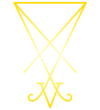Francis Bacon
High Priest
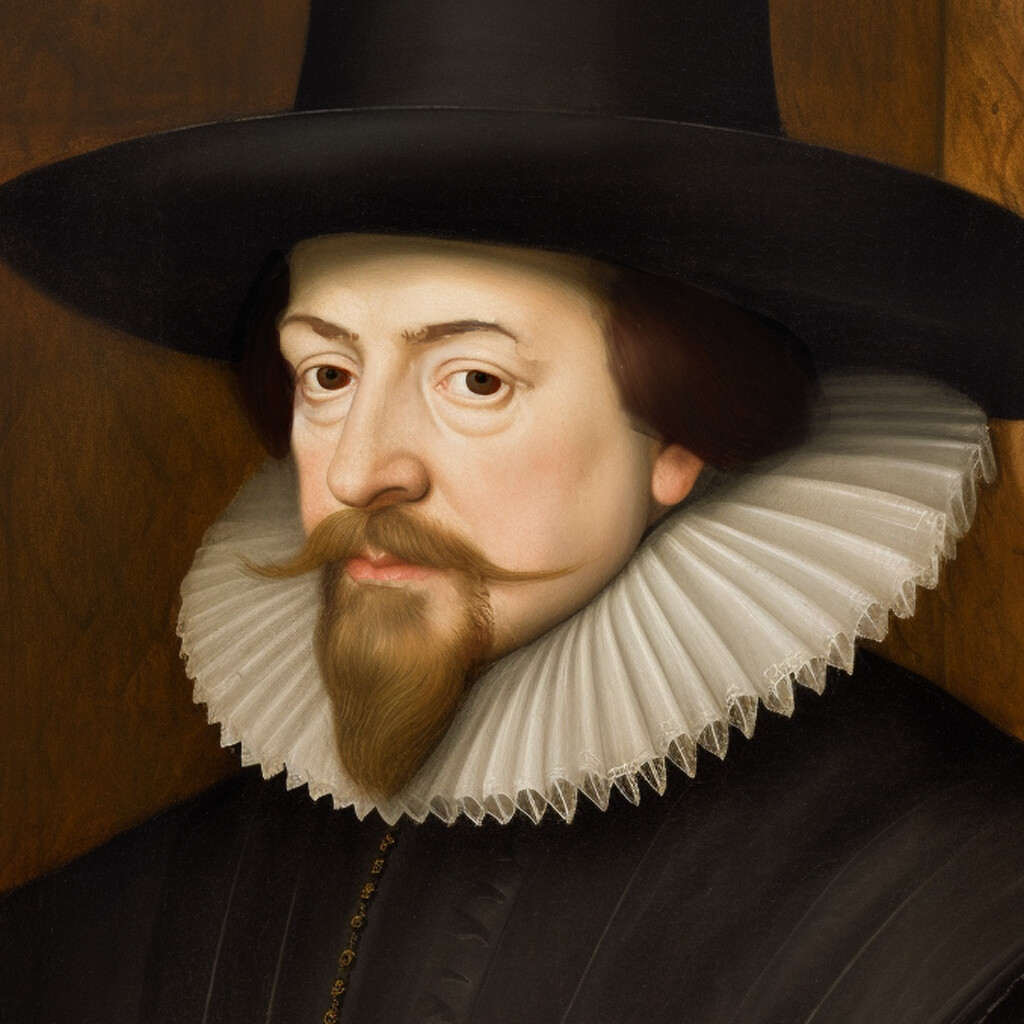
Sir Francis Bacon was a notable acolyte of the Gods who was of a significantly elevated spiritual level. In essence, he is the father of all modern science and modern law, as well as a polymath of excellence in endless other disciplines. Additionally, it was Bacon who played a significant role in establishing the new society in North America and in inspiring many of the precepts of the United States of America.
The most famous of his maxims was:
IPSA SCIENTIA PODESTAS EST (Knowledge is Power)
THE BOY GENIUS
Bacon was the son of the nobleman, Sir Nicholas Bacon, the Keeper of the Royal Seal and of endless other responsibilities, including many diplomatic efforts. His mother was the tutor Ann Bacon, one of the teachers of Edward VI, an expert in Latin and Greek who was unusually learned for her time. Growing up, he and his siblings spent much of his time abroad in the realms of France and the Holy Roman Empire. As a young boy, his luminous mind was noted by those around him and even by the Royal Court of England. Queen Elizabeth, herself a childhood prodigy, summoned him as a child to court to ask him various questions and to intellectually interrogate him. She was pleased by his demonstration of knowledge and wit.
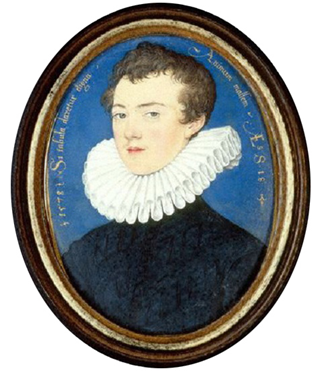
"Si tabula daretur digna animum mallem" (If one could but paint his mind), Nicholas Hilliard
By the age of fifteen he was ordained to be a lawyer and by his early twenties had been elected as an MP to Parliament. Out of all the people of the Personalities, Bacon was the most prodigious at a young age, alongside Emperor Marcus Aurelius and Friedrich Nietzsche.
Spiritually speaking, Bacon was a highly advanced individual who was able to navigate many dangerous and precarious situations. Others who fell afoul of the English court, such as his mentor-in-state the Duke of Essex or Sir Francis Drake, ended up dead due to ambitious intrigues. His expertise in the Classics and Law hinging on his knowledge of Latin and Ancient Greek was second-to-none. Therefore, it is not surprising to relay that Bacon came across the Gods himself in his own time, in person.
He is alleged to be "a devout Anglican" due to the amount of Christian content in his works. The simple truth was that any declaration of faith outside of Christianity was still punishable by death and any nobleman was expected to extoll Christianity in public life as a matter of course. Recent upheavals in the English situation meant that he had to work pragmatically within the new Church of England introduced by Henry VIII and reformed extensively by Elizabeth, which was still less controlling and stifling than the Catholic Church, the mafia that had terrorized England for close to a millennium. He also had to contend with the fanatical Puritan group of Protestants exerting immense power within England’s public life: James, the King of the realm beginning from 1603, was somewhat of a fanatical Protestant in moral matters woefully misled by Catholic intrigues, despite his less-than-Christian personal life.
One of Bacon’s reasons for referring to Christ concerns this allegory, also concerning his distant ancestor Roger Bacon whom Bacon took many ideas from:
Roger Bacon's (Alchemist during the Middle Ages) run-ins with Church authorities were typical of the relationship between alchemists and religious authorities in the Middle Ages and Renaissance. To avoid conflicts, some alchemists deliberately concealed their work in Christian terminology. For instance, the word 'Christ' was often used to refer to the Philosopher's Stone, the spark of life concealed in the darkness of matter. Other alchemists stopped publishing their ideas and went into hiding.
NOT Any So-Called Act of “God”, High Priestess Maxine Dietrich
SCIENTIFIC METHOD
Bacon is known as the pioneer of the modern scientific method. He was influenced strongly by Bernardino Telesio (a scientist whose books had been prohibited), an individual who was deeply dissatisfied with the Catholic Church, which had used Aristotle’s writings about metaphysics to justify a deduction-heavy form of scientific inquiry for centuries.
The Catholic Church had also warned against ‘idolatry’ with nature by observing it, considering drawing conclusions about the physical realm and its phenomena from nature to be suspicious compared with divine revelation, a viewpoint that only began to shift when Aristotelian ideas of sense perception had been introduced years before.
And as for the overmuch credit that hath been given unto authors in sciences, in making them dictators, that their words should stand, and not consuls, to give advice; the damage is infinite that sciences have received thereby, as the principal cause that hath kept them low at a stay without growth or advancement.1
Bacon, however, believed this had not been adopted far enough. Like Leonardo da Vinci before him, he was inspired by the divine command to learn from nature and to observe nature, while utilizing the senses to come to valid scientific conclusions, a process known as ‘induction’. he also sought to make his arguments about this highly public under the new Anglican regime.
This was compiled into his Magnum Opus, the Novum Organum, in 1620. Despite this, contrary to popular belief that Bacon was only an empiricist, his own works warn future scientists against an extreme form of empiricism divorced from the deductive process and against separating science from religion.
“V. Reflexiones Lucis.
Videndum quæ corpora lucem reflectunt; ut specula, aquæ, metalla polita, luna, gemmæ. Omnia liquida, et superficiæ valdè æquatæ et levi, splendent nonnihil. Splendor autem est gradus quidam pusillus luminis.
Videndum attente, utrum lux corporis lucidi ab alio corpore lucido reflecti possit: ut si sumatur ferrum ignitum, et opponatur radiis Solis. Nam reflexiones lucis omnino super-reflectuntur (elanguescunt tamen paulatim) de speculo in speculum. Alia.
V. Reflections of Light.It must be observed which bodies reflect light, such as mirrors, water, polished metals, the moon, and gems. All liquids, with surfaces that are smooth and even, shine to some degree. However, brightness is merely a small degree of light.
It must also be carefully noted whether the light of a luminous body can reflect from another luminous body. If one takes iron heated to incandescence, let it be opposed to the rays of the Sun. For reflections of light are entirely pre-reflections (gradually fading away) from the mirror or other body.”2
Many studies by Bacon exist. These include experiments with light, experiments in observation of the seas and oceans, endless chemical studies, observations of plants and animals alongside many more. These experiments would prompt Isaac Newton to develop his own theories more than a century and a half later.
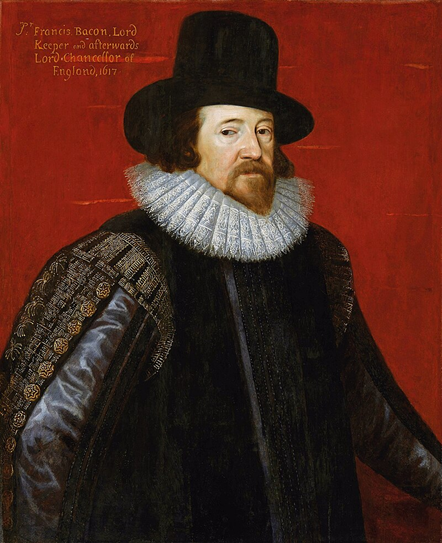
His ideas of science being based upon sense perception and the value of evidence in scientific inquiry were informed by his eminence in the art of Law. Bacon became so pre-eminent that he functioned as the lawyer of the state to Elizabeth and James, the Solicitor-General of England. In this position, he was known for his fondness of life, moderation and kindness. In several cases, he took this duty very seriously, however, being outspoken and could be ruthless to his enemies at court. For example, though Bacon himself favored the Union of England and Scotland, he informed James that it was impossible to mint coins as the King of Great Britain as it went against English law.
GIVER OF LAWS
Bacon believed law should function as a tool for the betterment of society as a whole. He advocated that the law be made accessible to all and be comprehensible to all, following on from the classical example of Solon and the legendary King of Rome, Numa Pompilius. Bacon proposed that cases should be noted down in public record as knowledge banks for study of the "unwritten law", an indispensable part of modern law education. Bacon insisted that the structure and theory of precedent cases (a case prior to the thing being judged) should be applied conservatively when judging a trial at hand, with any judge considering the validity of the tie to the other case carefully rather than using tradition to process cases hastily.
In the Advancement of Learning, he gives endless examples from Antiquity as to how a ruler should administer the laws.
Bacon insisted judges had a moral debt to society and that the weight of their decisions was strongly tied to the health of civilization.
He was fiercely opposed to the idea of merging Christianity with philosophy as so many Puritans of his day wished to do, standing opposed to the state of affairs that would culminate in Cromwell rising to power.
In the Novum Organum, Bacon goes further and equates the blending of philosophy with received religion as being a form of superstition present in men’s minds the ‘Idols of the Theater’ (Idola theatri); he specified that the Catholic Church was a purveyor of false idols and a danger to mankind. High Priest Hoodedcobra refers to this in this reply
Many of Bacon’s propaganda works are attempts at carefully attenuating and watering down the program of Christianity within the confines of the Anglican Church. The Gods instructed Bacon on how to formulate tracts to cause damage to Christianity from the inside. Several of these misunderstood and multi-faceted works, such as the New Atlantis, revolving around the superficially Christian and utopian society of Bensalem, point towards how the Christian program is introduced as a hoax or an image to a population.
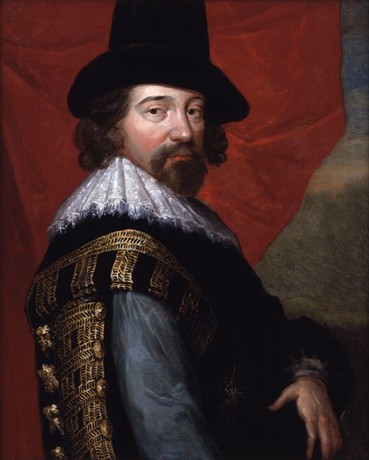
Viscount St Alban, John Vanderbank (1731), copy of unknown Stuart era painter
The mysterious middle point of the book talking at length about the duties of the so-called Tirsan (note the anagram to Artisan, a title of the Freemasons, also “in star”) and the rite of his son, ‘the Son of the Vine’, point towards the Dionysian mysteries. Bacon was fully aware of the enemy and through the character of Joabin, a ‘reformed’ Hebrew, uses this example to admonish the Hebrews for their crimes and to order them to stop their course of action of aggression:
Which they may the better do, because they are of a far differing disposition from the Jews in other parts … and have a secret inbred rancour against the people among whom they live: these (contrariwise) give unto our Saviour many high attributes, and love the nation of Bensalem extremely.3
The New Atlantis also contains many alchemical codes. The grandiose description of Salomon’s House, allegorically portrayed as a major institution for empirical learning and observation in Bensalem, is an allusion to the Solar Chakra being activated and "the Temple of the Sun". The various mass experiments he describes through this institution consisting of underground observations, observations of vast mountains and lakes, studies of disease, gardens of health and wellness, furnaces and industrial processes, areas of light observation and the so-called houses of secrecy are carefully crafted allusions to the stages of the Magnum Opus. On a purely material level, these allusions are rather futuristic for their time and pinpoint certain processes that would emerge in the Industrial Revolution.
In utmost secrecy, Sir Francis Bacon revived the destroyed Templar Order within the Stuart court. He belonged to the secretive Order of the Rose Cross. All of these secretive appointments rendered Bacon the High Priest of England of his time. One of the elements of his divine mission connected to his intrigues was the mystical similarly named Rosicrucian movement that appeared in Europe calling for an overthrow of the Church’s interference in education and the sciences. These materials were smuggled out of the ‘five ports’ and into the Cautionary Towns that England held in the continent, at which point they received a greater audience in Germany.
THE PLAYRIGHT’S MASTER
Contrary to contemporary belief, Sir Francis Bacon was also a major contributor to the Humanities and the Arts. He was initiated into the society of lawyers of Grey’s Inn at a young age and was known to have acted as a playwright, putting on certain plays to noblemen in his circle. Even in the conventional history, we know Bacon authored a book of poems, many of which were translations of Ancient Greek poets hitherto untranslated in English. For a man of his position, however, this was dangerous work, particularly if suspected of the atheism constantly associated with the theater by Puritans: it is also important to know that atheism itself was equated with treason and sedition against the monarch. Most noblemen in this arena operated under pseudonyms and under their patron’s guises.
His relationship to Shakespeare is often commented upon by various conspiracy theorists since the mid-19th century as Bacon being the ‘real author’ or ghost-writer of Shakespeare’s works. Shakespeare indeed was a real man, a very learned and capable playwright, but the truth is that Bacon was his tutor and patron who contributed an incredible amount to these works in collaboration with the ‘Man of Avon’.
To put it concisely, Shakespeare’s works contain detailed information about courtly life and many details of the American project under Bacon’s guidance that were totally impossible to know at the time of their being written due to information surrounding the Virginia Company being punishable by death, a huge factor that certain historians devoted to truth have gone at length to note:
Other unpublished information about the Virginia colony also seems to have found its way into the play [the Tempest], facts that later appeared in Ralph Harmor’s A True Discourse (1615) and John Smith’s The generall historie (1624)…4
Shakespeare was therefore Bacon’s right hand and acolyte, in a manner of speaking. Noting the fact his works almost seem ‘super-human’ in terms of writing is because they are informed by a semi-divine intelligence, one that transformed the English language into art unknown at that time or in our period.
This is also why Shakespeare’s works are noted to have a fundamentally differing and romantic character in the earlier days as compared with his later works, which have more of Bacon’s personal involvement and involve more general, heroic themes.
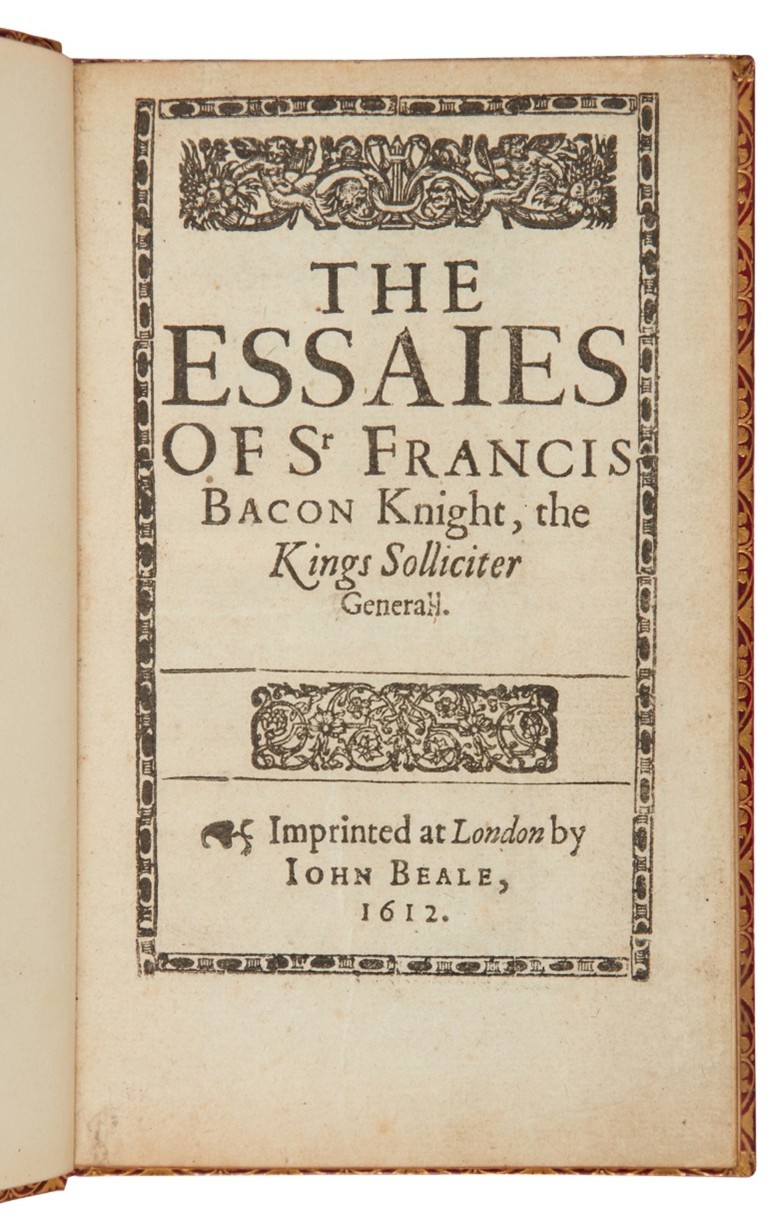
As a minister and lawyer of state, Bacon survived many intrigues against him. He was even made the Viscount St. Alban by the King in 1621. However, when falling into debt, the court moved against him at the behest of Sir Edward Coke, his greatest rival who was seeking revenge, along with George Villiers and the de Vere family. Bacon was charged with twenty-three counts of corruption and many other smears were heaped onto him by the Puritans who tried to use his private life against him. Although he was held in the Tower, Bacon managed to escape true humiliation.
It was claimed Bacon died of pneumonia after travelling through the snow of St. Albans. In reality, he had achieved a level of existence unknown to many.
BIBLIOGRAPHY
1On the Advancement of Learning, Sir Francis Bacon
2Topica Inquisitionis de Luce et Lumine, Francis Bacon
3The New Atlantis, Sir Francis Bacon
4Francis Bacon’s Contribution to Shakespeare, Barry R. Clarke
Novum Organon, Sir Francis Bacon
Resuscitatio, William Rawley
The Very Idea of Modern Science, Joseph Agassi
CREDIT:
[TG] Karnonnos

 አማርኛ
አማርኛ العربية
العربية বাংলা
বাংলা Български
Български 中文
中文 Čeština
Čeština Dansk
Dansk Deutsch
Deutsch Eesti
Eesti Ελληνικά
Ελληνικά Español
Español Français
Français हिन्दी
हिन्दी Hrvatski
Hrvatski IsiZulu
IsiZulu Italiano
Italiano 日本語
日本語 Kiswahili
Kiswahili Magyar
Magyar Македонски
Македонски नेपाली
नेपाली Nederlands
Nederlands فارسی
فارسی Polski
Polski Português
Português Română
Română Русский
Русский Slovenščina
Slovenščina Suomi
Suomi Svenska
Svenska Tagalog
Tagalog Türkçe
Türkçe